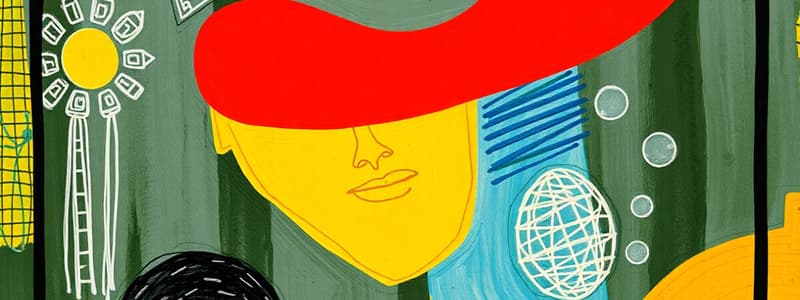Podcast
Questions and Answers
What is the purpose of hyperbole in writing?
What is the purpose of hyperbole in writing?
- To emphasize a particular point (correct)
- To create a vivid image in the reader's mind
- To create a mysterious or suspenseful atmosphere
- To provide a humorous effect
What is an example of personification in writing?
What is an example of personification in writing?
- The boy ran quickly down the road.
- The wind whispered secrets through the trees. (correct)
- The sun shone brightly in the sky.
- The cat sat on the mat.
Which of the following is an example of internal rhyme?
Which of the following is an example of internal rhyme?
- The wind howled and the trees swayed.
- The rain in Spain falls mainly on the plain. (correct)
- The sun shone bright, a beautiful sight.
- The cat sat on the mat.
What is an allegory?
What is an allegory?
What is the difference between assonance and consonance?
What is the difference between assonance and consonance?
What is an example of onomatopoeia?
What is an example of onomatopoeia?
What are the two main categories of stories?
What are the two main categories of stories?
What is the purpose of dialogue in a story?
What is the purpose of dialogue in a story?
Which of the following is NOT a characteristic of Contemporary Literature?
Which of the following is NOT a characteristic of Contemporary Literature?
How does the 'Reader-Response' approach differ from 'Formalism' in analyzing literature?
How does the 'Reader-Response' approach differ from 'Formalism' in analyzing literature?
Which of the following is NOT a key feature of fictional works, as discussed in the content?
Which of the following is NOT a key feature of fictional works, as discussed in the content?
Which of the following accurately describes 'Analysis' in the context of literary analysis?
Which of the following accurately describes 'Analysis' in the context of literary analysis?
How do 'Themes' differ from 'Interpretation' in the context of literature?
How do 'Themes' differ from 'Interpretation' in the context of literature?
Which statement best reflects the relationship between 'Evidence in the text' and 'the reader's own interests, values, and desires' in shaping the interpretation of fiction?
Which statement best reflects the relationship between 'Evidence in the text' and 'the reader's own interests, values, and desires' in shaping the interpretation of fiction?
What is the primary purpose of 'Evaluation' in the context of fiction?
What is the primary purpose of 'Evaluation' in the context of fiction?
According to the content, how does the 'Sociological' approach analyze literature?
According to the content, how does the 'Sociological' approach analyze literature?
Which of the following is NOT a common element of fiction?
Which of the following is NOT a common element of fiction?
In the context of fiction, what is the purpose of Freytag's Pyramid?
In the context of fiction, what is the purpose of Freytag's Pyramid?
What distinguishes the horror genre from other types of fiction?
What distinguishes the horror genre from other types of fiction?
What is the role of the protagonist in a fictional narrative?
What is the role of the protagonist in a fictional narrative?
What is a common characteristic of contemporary fiction?
What is a common characteristic of contemporary fiction?
Why is fiction considered subjective and evocative?
Why is fiction considered subjective and evocative?
What is the primary focus of fantasy fiction?
What is the primary focus of fantasy fiction?
What makes interpreting fictional works challenging?
What makes interpreting fictional works challenging?
Which genre is characterized by its focus on solving mysterious events and crimes?
Which genre is characterized by its focus on solving mysterious events and crimes?
What is the primary characteristic that distinguishes Historical Fiction from other genres?
What is the primary characteristic that distinguishes Historical Fiction from other genres?
Which genre typically involves a fast-paced plotline and constant tension, keeping readers on the edge of their seats?
Which genre typically involves a fast-paced plotline and constant tension, keeping readers on the edge of their seats?
What is a common element found in Realistic Fiction, typically absent in other genres?
What is a common element found in Realistic Fiction, typically absent in other genres?
What is the difference between Simile and Metaphor in literary techniques?
What is the difference between Simile and Metaphor in literary techniques?
What is the objective of Psychological Literary Criticism?
What is the objective of Psychological Literary Criticism?
What is the definition of "Meter" in literary terms?
What is the definition of "Meter" in literary terms?
Which of these literary approaches focuses on understanding a text through the lens of the author's personal life?
Which of these literary approaches focuses on understanding a text through the lens of the author's personal life?
What type of mobility involves a change in social status, either up or down, due to factors like education or career?
What type of mobility involves a change in social status, either up or down, due to factors like education or career?
In the context of poetry, what is the term for a section of a poem named for the number of lines it contains?
In the context of poetry, what is the term for a section of a poem named for the number of lines it contains?
Which literary device is primarily associated with the 'Reader-Response' approach to literary analysis?
Which literary device is primarily associated with the 'Reader-Response' approach to literary analysis?
Which of the following is NOT a core element of the 'Poetry' definition provided in the content?
Which of the following is NOT a core element of the 'Poetry' definition provided in the content?
Which of the following best describes the 'Theme' aspect of literary analysis?
Which of the following best describes the 'Theme' aspect of literary analysis?
What is the primary responsibility of the reader when analyzing symbolism used in a text?
What is the primary responsibility of the reader when analyzing symbolism used in a text?
What is the key difference between a 'mystery' and a 'thriller' genre, according to the text?
What is the key difference between a 'mystery' and a 'thriller' genre, according to the text?
According to the content, what is the primary purpose of 'Science Fiction'?
According to the content, what is the primary purpose of 'Science Fiction'?
Flashcards
Universal Themes
Universal Themes
Themes that are understood across different cultures and societies.
Contemporary Literature
Contemporary Literature
Literature that reflects modern themes and societal issues, often through resistance against oppression.
Character-driven Stories
Character-driven Stories
Narratives that emphasize character development over plot progression.
Literary Analysis
Literary Analysis
Signup and view all the flashcards
Reader-Response Theory
Reader-Response Theory
Signup and view all the flashcards
Gender Approach
Gender Approach
Signup and view all the flashcards
Sociological Literary Analysis
Sociological Literary Analysis
Signup and view all the flashcards
Fictional Ambiguity
Fictional Ambiguity
Signup and view all the flashcards
Hyperbole
Hyperbole
Signup and view all the flashcards
Personification
Personification
Signup and view all the flashcards
Alliteration
Alliteration
Signup and view all the flashcards
Allegory
Allegory
Signup and view all the flashcards
Irony
Irony
Signup and view all the flashcards
End Rhyme
End Rhyme
Signup and view all the flashcards
Onomatopoeia
Onomatopoeia
Signup and view all the flashcards
Repetition
Repetition
Signup and view all the flashcards
Fiction
Fiction
Signup and view all the flashcards
Characters
Characters
Signup and view all the flashcards
Setting
Setting
Signup and view all the flashcards
Plot
Plot
Signup and view all the flashcards
Conflict
Conflict
Signup and view all the flashcards
Theme
Theme
Signup and view all the flashcards
Horror Genre
Horror Genre
Signup and view all the flashcards
Fantasy
Fantasy
Signup and view all the flashcards
Point of View
Point of View
Signup and view all the flashcards
Symbolism
Symbolism
Signup and view all the flashcards
Stanza
Stanza
Signup and view all the flashcards
Enjambment
Enjambment
Signup and view all the flashcards
Capitalization and Punctuation in Poetry
Capitalization and Punctuation in Poetry
Signup and view all the flashcards
Vertical Mobility
Vertical Mobility
Signup and view all the flashcards
Literary Devices
Literary Devices
Signup and view all the flashcards
Science Fiction
Science Fiction
Signup and view all the flashcards
Mystery
Mystery
Signup and view all the flashcards
Historical Fiction
Historical Fiction
Signup and view all the flashcards
Thriller
Thriller
Signup and view all the flashcards
Realistic Fiction
Realistic Fiction
Signup and view all the flashcards
Romance
Romance
Signup and view all the flashcards
Imagery
Imagery
Signup and view all the flashcards
Simile and Metaphor
Simile and Metaphor
Signup and view all the flashcards
Study Notes
Contemporary Popular and Emergent Literature
- Fiction is a form of literature, primarily imagined and not entirely based on facts or history
- Fiction is subjective and uses evocative language
- It evokes experiences, possibilities, historical periods, human conditions
- Interpretation of fiction is subjective, influenced by reader's perception, imagination, feelings, and evidence within the text
- Fictional analysis involves understanding themes, perspectives, and narrative techniques
- Fictional works often reflect broader human experiences
- Example themes include "virtue rewarded" and "folly of lack of industry"
Contemporary Literature
- Contemporary literature reflects resistance movements against restrictive governmental systems
- It includes poetry and prose, encompassing a writing style and quality
- Characteristics include reality-based stories, believable storylines, current settings, and character-driven plots
Literary Approaches
- Formalism analyzes elements of a text to understand its characteristics formally
- Reader-Response approach focuses on the reader's interpretation of the text's meaning
- Gender Approach analyzes how socially constructed gender roles impact the literature
- Sociological approach considers the cultural, economic, and political context of the work
- Historical approach examines broader historical and cultural influences on the author
- Biographical approach interprets the text based on the author's life experiences
- Psychological approach analyzes what happens in the reader's mind, and what feelings/thoughts are evoked
Elements of Fiction
- Characters are the individuals, animals, or aliens within a story
- Setting describes the time and place of the story
- Plot is the sequence of events in a story
- Conflict is the struggle between characters
- Theme is the underlying message or truth conveyed
- Theme can be universal, understood across cultures
Types of Fiction
- Science fiction typically involves futuristic settings and scientific concepts
- Mystery focuses on solving crimes and mysterious events
- Historical fiction takes place in the past
- Thriller features tension and suspense
- Realistic fiction depicts events that could happen in real life
- Romance involves a central romantic relationship
- Horror seeks to evoke feelings of fear and excitement
- Fantasy centers on magical and supernatural elements
Literary Techniques
- Imagery uses figurative language to create vivid mental images
- Simile and metaphor compare two distinct things
- Hyperbole uses exaggeration for emphasis
- Personification gives human qualities to nonhuman entities
- Alliteration repeats consonant sounds
- Allegory uses characters, actions, or events to represent abstract ideas
- Irony involves contrasting the literal and intended meaning
Studying That Suits You
Use AI to generate personalized quizzes and flashcards to suit your learning preferences.




